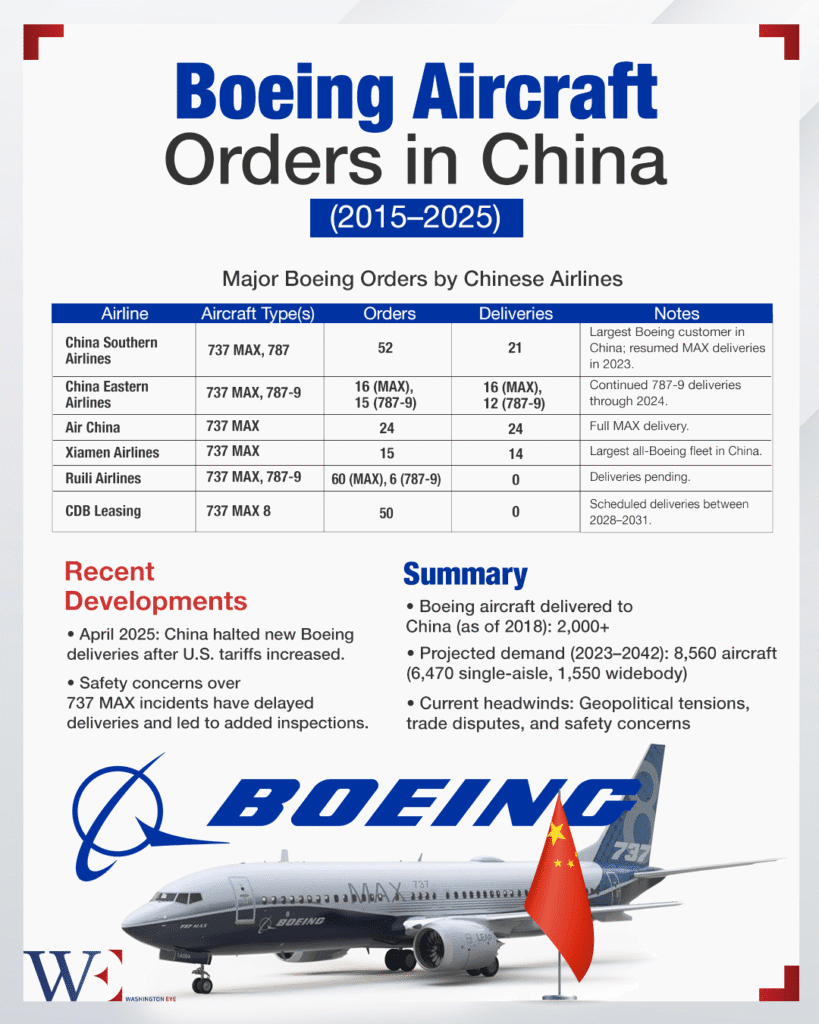In a significant escalation of the ongoing trade dispute between the United States and China, Beijing has instructed its domestic airlines to suspend all deliveries of Boeing aircraft and halt purchases of U.S.-made aircraft components. This directive, reported by Bloomberg News and confirmed by multiple sources, marks a substantial blow to Boeing’s operations and underscores the deepening rift between the world’s two largest economies.
The Chinese government’s decision comes in direct response to the U.S. administration’s recent imposition of a 145% tariff on Chinese imports. In a tit-for-tat move, China had earlier raised its tariffs on U.S. goods to 125%. The suspension of Boeing aircraft deliveries is seen as a strategic maneuver to exert pressure on the U.S. by targeting one of its key manufacturing sectors.
China has been a pivotal market for Boeing, accounting for approximately 15% of the global civil aviation market, with projections to reach 20% within the next 15 years. The halt in deliveries affects major Chinese carriers, including Air China, China Eastern Airlines, and China Southern Airlines, which collectively had plans to receive 179 Boeing planes between 2025 and 2027.
The directive also extends to the cessation of purchases of aircraft-related equipment and parts from U.S. companies. This move is anticipated to increase maintenance costs for existing Boeing aircraft operating within China, further straining the operational budgets of Chinese airlines.
Strategic Shift Towards Airbus and COMAC
In light of the suspension, Chinese airlines are expected to accelerate their shift towards alternative aircraft manufacturers. European aerospace giant Airbus stands to benefit, having already been gaining market share in China. Additionally, China’s domestic aircraft manufacturer, Commercial Aircraft Corporation of China (COMAC), is poised to capitalize on the situation, aligning with Beijing’s long-term goal of reducing reliance on foreign aerospace technology.
The suspension exacerbates an already challenging period for Boeing. The company concluded 2024 with significant financial losses amounting to $11.8 billion, attributed to legal issues, mechanical problems, and management upheavals. Boeing’s stock has experienced a substantial decline, dropping over a third due to these cumulative setbacks.
The escalating trade tensions and the resultant suspension of Boeing aircraft deliveries have introduced considerable uncertainty into the global aviation industry. Analysts warn that the ongoing tariff exchanges between the U.S. and China, which had a goods trade valued at over $650 billion in 2024, could lead to a broader disruption in international trade relations.
Prospects for Resolution
While the U.S. administration has indicated a willingness to negotiate, no concrete agreements have been reached. The aviation industry, along with global markets, remains on edge, closely monitoring developments and hoping for a de-escalation of trade tensions that could restore stability to international aerospace commerce.
China’s directive to halt Boeing aircraft deliveries signifies a critical juncture in U.S.-China trade relations, with far-reaching implications for the global aviation industry. As both nations navigate this complex economic landscape, the international community watches with anticipation, recognizing the profound impact these developments may have on global trade dynamics and the future of aerospace manufacturing.
















